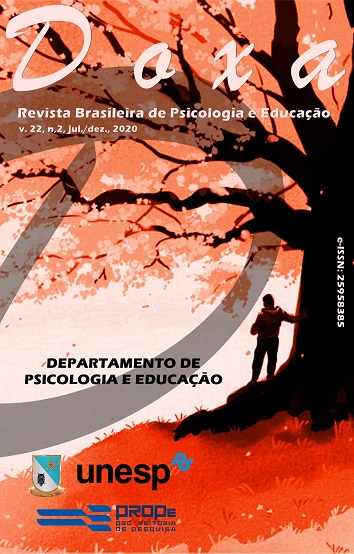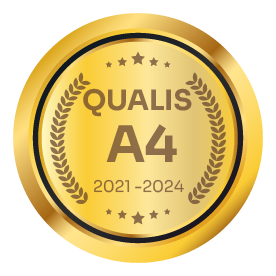Non-obvious truisms of education: public school
DOI:
https://doi.org/10.30715/doxa.v22i2.14209Keywords:
Research, Teaching and learning, PsychologyAbstract
Development is not an open nod that, even having external motivations/pressions, needs to be solved from the inside out, with due authorship. Today there is no chance for a country to try any economic policy alternative that opposes liberalism, even if it is not Marxist or similar. Liberalism is a violent straitjacket, even if the notion of freedom is essential in etymology. Let us not simplify things, however. When we observe in African countries that girls are genitally mutilated for religious reasons, the impulse is to defend them, because sexuality itself is an inalienable right. Those who believe that even though human rights are endowed with relative (non-relativistic) validity, it is the case to condemn such mutilation practices, because humans cannot be truculently disfigured enters into a complex area, such as interfering with the education of children, to prevent girls from being domesticated as servants of men. In any case, however, we must prefer convincing approaches, although one can or should even admit intervention to prevent truculences of this magnitude.
Downloads
References
ANUÁRIO BRASILEIRO DA EDUCAÇÃO BÁSICA 2019. Todos pela Educação/Moderna. São Paulo. Disponível em: https://www.todospelaeducacao.org.br/_uploads/_posts/302.pdf. Acesso em: 20 set. 2020
CHRISTENSEN, C. M. The innovator’s dilemma: the revolutionary book that will change the way you do business. Harper Business, 2011.
DEMO, P. Pobreza política. A pobreza mais intensa da pobreza brasileira. Campinas, SP: Autores Associados, 2007
DEMO, P. Sucesso educacional em questão. Supremacia asiática educacional questionada. 2020. Disponível em: https://pedrodemo.blogspot.com/2020/08/ensaio-532-sucesso-educacional-em_25.html. Acesso em: 20 set. 2020.
DEMO, P. Educação à Deriva. À direita e à esquerda: instrucionismo como patrimônio nacional. 2020a. Disponível em: https://drive.google.com/file/d/10nMlgL8N9GKFgwtnbL-bIn7GQf0HdyA4/view. Acesso em: 20 set. 2020.
DEMO, P. O que resta da escola na vida. 2020b. Disponível em: https://drive.google.com/file/d/1swMQ-4m1DKJ4Nhfa_CbxrR4upYKZLPBG/view. Acesso em: 20 set. 2020.
DEMO, P. Renda básica. 2020c. Disponível em: https://drive.google.com/file/d/1y6VdrxfgsUQ2Fbwx-QiQyfdlBMAutVcJ/view. Acesso em: 20 set. 2020.
FOUCAULT, M. Vigiar e punir. História da violência nas prisões. Petrópolis: Vozes, 1977.
FREIRE, P. A Importância do ato de ler. São Paulo: Cortez, 1989. Disponível em: http://educacaointegral.org.br/wp-content/uploads/2014/10/importancia_ato_ler.pdf. Acesso em: 20 set. 2020.
FUMAGALLI, A.; GIULIANI, A.; LUCARELLI, S.; VERCELLONE, C. Cognitive capitalism, welfare and labor: the commonfare hypothesis. Routledge, 2019.
INAF. Indicador de Alfabetismo Funcional. Instituto Paulo Montenegro. Ação Educativa. São Paulo, 2018.
LEE, K-F. AI Superpowers: China, Silicon Valley, and the new world order. N.Y.: Houghton Mifflin Harcourt, 2018.
LUBIENSKI, C. A.; LUBIENSKI, S. T. The public school advantage: why public schools outperform private schools. Chicago: University of Chicago Press, 2013.
MANGUEL, A. Uma história da leitura. São Paulo: Companhia das Letras, 1996.
MEZIROW, J. Learning as transformation. Critical perspectives on a theory in progress. San Francisco: Jossey-Bass, 2000.
MEZIROW, J.; TAYLOR, E. W. Transformative learning in practice: insights from community, workplace, and higher education. London: Jossey Bass, 2009.
MEZIROW, J. Learning as transformation. San Francisco: Jossey-Bass, 2000.
MILANOVIC, B. Capitalism, alone. The future of the system that rules the world. Harvard U. Press, 2019.
PIKETTY, T. Capital and Ideology. Harvard U. Press, 2020.
RINDERMANN, H. Cognitive capitalism. Human capital and the wellbeing of nations. Cambridge U. Press, 2018.
RIPLEY, A. The smartest kids in the world: and how they got that way. N.Y.: Simon & Schuster, 2013.
SAHLBERG, P. Finnish lessons. What can the world learn from educational change in Finland? N.Y.: Teachers College, 2010.
SAHLBERG, P. FinishED leadership. Thousand Oaks: Corwin, 2017.
SEVERINO, A. J. Pesquisa educacional: da consistência epistemológica ao compromisso ético. Revista Ibero-Americana de Estudos em Educação, Araraquara, v. 14, n. 3, p. 900–916, 2019. DOI: 10.21723/riaee.v14i3.12445. Disponível em: https://periodicos.fclar.unesp.br/iberoamericana/article/view/12445. Acesso em: 28 dez. 2019.
TAYLOR, E. W.; CRANTON, P. The handbook of transformative learning. Theory, research, and practice. San Francisco: Jossey-Bass, 2012.
WERNECK, H. Se você finge que ensina, eu finjo que aprendo. Petrópolis: Vozes, 1993.
WORLD BANK (WB). Learning: to realize education’s promise. Washington: The World Bank, 2018. Disponível em: https://openknowledge.worldbank.org/handle/10986/28340. Acesso em: 20 set. 2020.
WORLD BANK (WB). Poverty and shared prosperity 2018: piecing together the poverty puzzle. Washington: The World Bank, 2018a. Disponível em: https://openknowledge.worldbank.org/bitstream/handle/10986/30418/9781464813306.pdf. Acesso em 20 set. 2020.
WORLD BANK (WB). The Changing Nature of Work. Washington: The World Bank, 2019. Disponível em: http://documents.worldbank.org/curated/en/816281518818814423/pdf/2019-WDR-Report.pdf. Acesso em: 20 set. 2020.
ZHAO, Y. Who is afraid of the big bad dragon: why China has the best (and the worst) education system in the world? San Francisco: Jossey-Bass, 2014.
ZHAO, Y. What works may hurt. Side effects in education. Teachers College Press, 2018.
ZHAO, Y.; EMLER, T. E.; SNETHEN, A.; YIN, D. An education crisis is a terrible thing to waste. How radical changes can spark student excitement and success. Teachers College Press, 2019.
Downloads
Published
How to Cite
Issue
Section
License
Copyright (c) 2020 DOXA: Revista Brasileira de Psicologia e Educação

This work is licensed under a Creative Commons Attribution-NonCommercial-ShareAlike 4.0 International License.
Manuscritos aceitos e publicados são de propriedade da Doxa. É vedada a submissão integral ou parcial do manuscrito a qualquer outro periódico. A responsabilidade do conteúdo dos artigos é exclusiva dos autores. É vedada a tradução para outro idioma sem a autorização escrita do Editor ouvida a Comissão Editorial.










